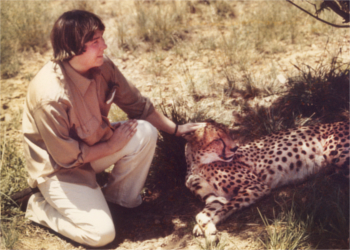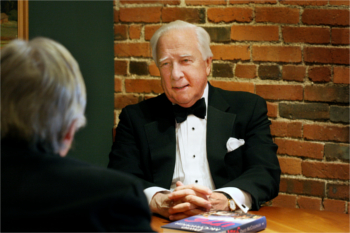Chriss Swaney has more than 20 years of experience as a reporter and editor for national and international publications, including Reuters, UPI, The New York Times and Gannett. She spent 13 years as at Carnegie Mellon University as its media relations and public relations director for the College of Engineering.

Dan Rooney, chairman of the Pittsburgh Steelers and former U.S. ambassador to Ireland, was interviewed about his book My 75 Years with the Pittsburgh Steelers and the NFL.
Current Job: Managing editor for Dick Jones Communications, a boutique public relations agency in the Pittsburgh region that works to tell great stories through ideas. The firm primarily focuses on areas that intersect with higher education.
Hometown: Pittsburgh, Pa.
Education: Duquesne University, BA Degree in Journalism and Master’s in Marketing Communications.
Languages: French and German.
First Job in Journalism: Worked as a general assignment reporter for the Greensburg Tribune-Review Newspaper in Greensburg, Pa. My first assignment was a
chewing tobacco contest at the county fair where I promptly won the contest but was sick for a week from swallowing tobacco juice.
Countries I’ve reported from: Northern Ireland, Great Britain, South Africa, Germany and Japan.
When I joined the OPC:
I joined the OPC about 20 years ago because the organization offers a great oasis for reporting and taking stock of one’s assignments from a wonderful cache of partner clubs in just about every exotic foreign location one could imagine. The OPC also offers wonderful programs that focus on current headlines and critical long-term global policy issues.

Best advice about journalism received: I had the great fortune to meet The Wall Street Journal’s William E. Blundell when I was a business reporter in Alaska. Bill thanked me for being a “great Alaskan guide” and also admonished me to remember the common demand of readers everywhere: “For Pete’s sake, make it interesting. Tell me a story.”
Worst experience as a journalist: When former Prime Minister Margaret Thatcher visited Anchorage, I got too close to her motorcade and was detained by British security agents. They took my camera, but I eventually got to interview Thatcher for 15 minutes when she heard about my reporting tenacity. I also gave her a brief history lesson about Cook Inlet.
When traveling:
Always take plenty of water, toilet paper and granola bars.
Hardest story to write: One of the most difficult stories was about baboon liver transplants. I was a Reuters stringer in Pittsburgh and to reach the primary story contacts I had to wade through throngs of protestors dressed like monkeys. It was a bit unnerving.
Most demanding story: Probably, the story I did for Dynamic Business magazine about a freelance trek to Northern Ireland where I was stopped by British troops near a
former IRA bomb site. I was asked what my religion was and I responded: “I’m an agnostic.” The British commander called me a “smart ass” took my camera, destroyed all my film and then released me.

While on assignment in South Africa to cover drought and wildlife preserves, Swaney visited a cheetah sanctuary near Cape Town.
My journalism heroes: Ernie Pyle who had a wonderful ear for the laconic remark, and who covered the “Greatest Generation,” which included my late father who served as a Marine Corps aviator in the Pacific theater of World War II. And journalists Danny Pearl, James Foley and Steven Sotloff who paid the ultimate price for trying to bring some journalistic civility to a lawless, brutal region of the world.
Advice to journalists who want to work overseas:
Establish a safe house, know your contacts, learn the language, get reliable drivers and translators, and get in and out quickly.
Advice for life after journalism: I’ve been able to take my reporting skills and carve a nice niche for my tenacity and love of words in the world of public and media relations. Taking the plunge from the news desk to PR is a little like pain dipped in honey. I’m still an explorer, problem solver, and most of all, a great listener.
How has a background in journalism helped in other work: There is no formula for how to write or convey stories. But my journalism background and inquisitive nature gives me the tools to take the first glimmer of an idea to final editing. Over the years, I’ve learned that all writing and reporting is about solving a problem. It may be a problem of where to find the facts or what angle to take. In the end, it is all about the fact that opportunity does not knock, it’s already here.
Dream job: I’ve got it right now. I like working from the ground floor and making every story for my clients as comfortable as an old wrinkled shirt.
Favorite quote: Great leaders know what to do with the ball when someone hits it their way.

Swaney and historian David McCullough, talk about his book <em>1776</em>, have common ground in having the hometown of Pittsburgh.
Place most eager to visit: Bhutan. It is perhaps one of the last most unspoiled areas of the world where commercialism has failed to make a dent.
Most over-the-top assignment: The time I had to do a feature story about a flying saucer club in western Pennsylvania. These geeks really believed in “little green men” from Mars.
My pet peeve about editors: They need to listen more. Sometimes their preconceived notion about a topic or story can taint a writer’s style.
The country I’d return to: South Africa. I was there during Apartheid and it was like a pre-Civil War USA. I would like to return and see the massive change. The wildlife, people and varied cultures are fascinating and challenging.
